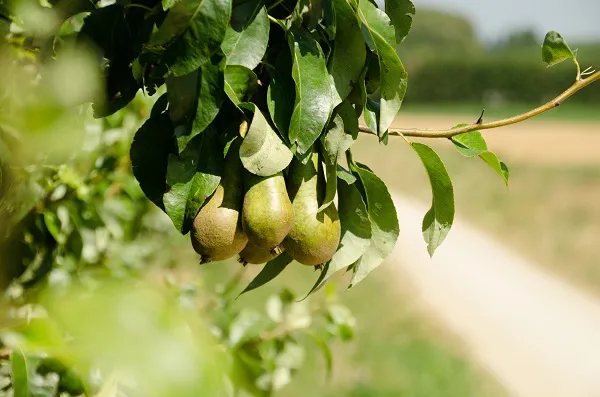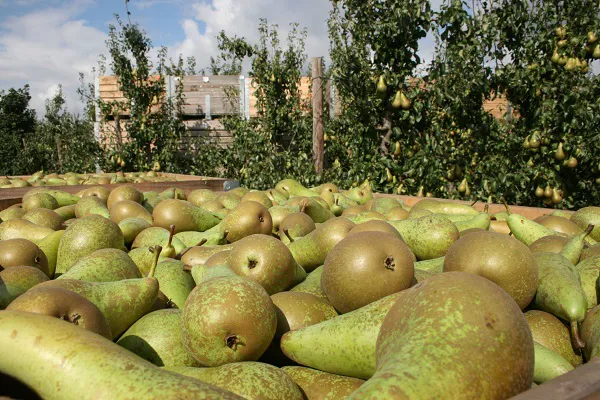"Over the past few years, pears have gradually helped balance the dismal apple sector. However, this season, pears, too, are off to a very tough start," is how Annelies Coussé describes the mediocre start of the Belgian top fruit season. She is a horticulture consultant at Boerenbond, the Belgian Farmers Union. "It remains to be seen how things will develop. Last year, we had the advantage that the rest of Europe had a low pear harvest. Not so this year."

The frost damage early in the season and, later, the drought and hot summer all affected the fruit sizes too: they are on the small side. "The non-ideal size discourages good prices," says Annelies. Although challenges like energy and labor costs affect the entire top fruit sector, apple growers are having an especially hard time. "Apples have been struggling for years. Belgium is a small player in that sector. So, we have zero market influence, price-wise. That, while our costs prices are way higher than European standards."

Labor, crop protection, and energy are the main expenses driving up cost prices. "That's a fruit company's top three costs, and we're experiencing many problems in all three areas," Annelies continues. For some time now in Belgium, every year, pears replace 100 hectares of apple trees. Where previously mainly Conference pears replaced apple trees, new club varieties are now increasingly coming into the picture. A good thing, she thinks. "We warn against monoculture. It can cause issues if you bet everything on Conference and something goes wrong, sales or cultivation-wise. It's especially important to spread sales risks."
Less cooling
Also, Coussé sees that, due to sun damage or staff shortages, growers tend to leave some of their apples hanging on the trees. Plus, fewer apples are being refrigerated, as growers are not expecting to make enough to cover those high costs. Though, she is hearing noises from traders that apple prices should improve later in the season.

The Belgian apple sector is faring so badly that Annelies foresees a definite downsizing. The Boerenbond is looking for solutions and whether and how to support growers via buy-back schemes and minimum prices. Complex regulations, however, often sink such schemes. "And not everyone in our trade groups considers minimum prices the answer. Boerenbond is satisfied with the crisis support fruit growers could get because of the war in Ukraine. We also have very high hopes regarding the concrete interpretation of the CAP and for PO members, very specifically the CMO," she explains.
Annelies points to Belgian apple growers getting significantly lower prices than large apple producers such as Poland or Austria as a sore point. "We're at the bottom. The big apple countries get almost double what we do, but cost prices aren't proportional." The geopolitical situation in Eastern Europe caused demand to plummet, leading to market pressure. That did not help either. And the sector places some of the blame at auctions' feet.
"There's criticism of the way modern auctions work. A lot of fruit is sold in other ways, with only the surpluses still being auctioned where the entire sector's price is based. That perception must be dispelled, and Boerenbond is happy to help try and solve that. We're willing to improve commercialization, too, and help fruit growers return to a financially profitable model. The whole chain will have to tackle this so everyone can earn a living," adds Annelies.
Consumer prices lead to much frustration among top fruit growers and she emphasizes the importance of fair grower prices." Without growers, traders and retailers have nothing. It pains growers that supermarkets sell apples for the same price as pears, while the apple growers only get half as much." The horticultural consultant wonders where that profit goes since everyone in the chain is passing on the rising costs except growers.
"Growers at the end of that chain, thus, cannot pass on the costs. They're the only link that has to sell at a loss. Retailers have a huge responsibility here because consumers also realize everything's becoming more expensive. There are many questions when only the price is decisive, and all other sustainability issues suddenly mean nothing or very little," says Annelies.
Declining apple consumption
Neither does the declining apple consumption in Belgium help. Based on research, Boerenbond expects consumption figures to be eight percent lower than last year. "During the pandemic, people returned to eating local produce, but that has subsided. Local fruit is already not selling as easily."
Boerenbond considers increased local consumption as part of the solution. Annelies wants to raise awareness of local top fruit, especially increasing its visibility. "We want Europe and Flanders to help boost promotions in such a way that Belgian products are recognizable in stores. When you walk into a supermarket, you sometimes have to look very carefully to find where products come from. People aren't always sufficiently aware of what is and isn't Belgian," she concludes.
Annelies Coussé
Boerenbond
T: (011) 30 37 08
E: annelies.cousse@boerenbond.be
W: www.boerenbond.be
